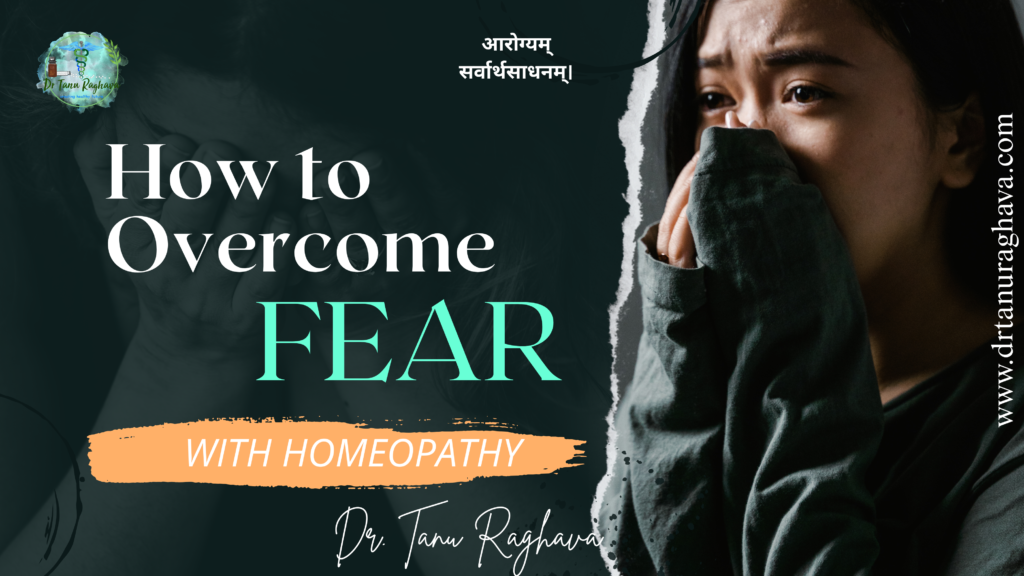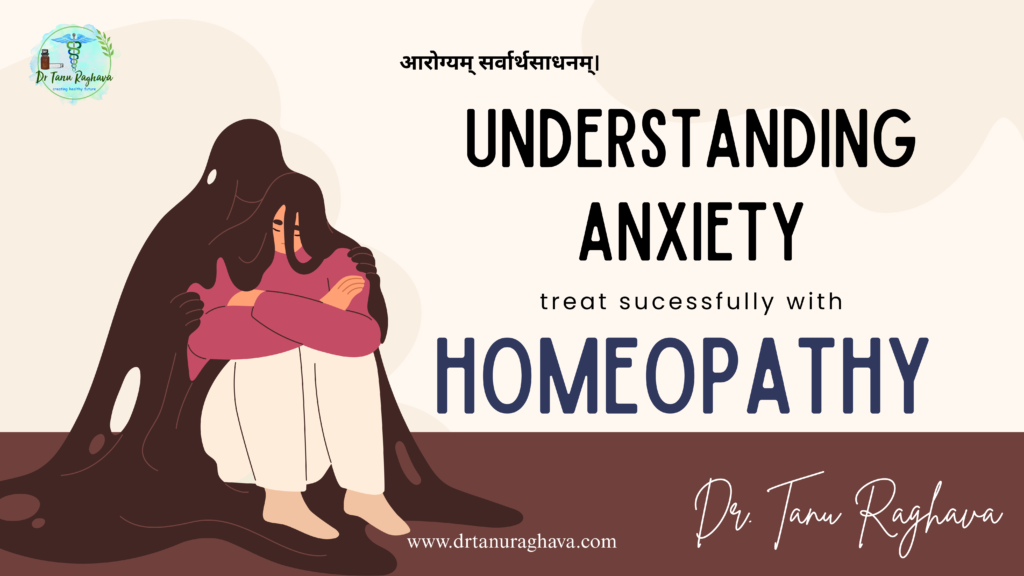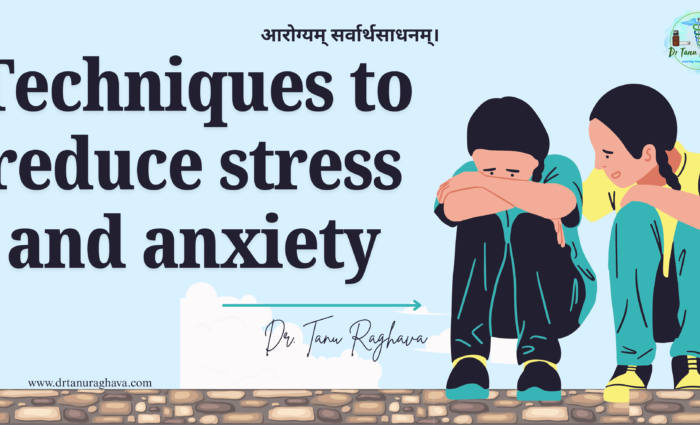Introduction: Why Stress Management is Crucial
Table of Contents
ToggleIn today’s fast-paced world, stress and anxiety have become constant companions for many. Whether it stems from work pressure, personal responsibilities, or health concerns, prolonged stress can severely impact both physical and emotional well-being. As a Homeopathic Physician and Nutritional Counselor, Dr. Tanu Raghava emphasizes the importance of natural and sustainable methods to manage and reduce stress levels.
Understanding Stress and Anxiety: The Silent Disruptors
Stress is the body’s natural response to any perceived threat or pressure. Anxiety, though often used interchangeably, is more of a prolonged emotional state that can stem from unmanaged stress. Chronic anxiety can affect sleep, digestion, immunity, and even hormonal balance. Therefore, Dr. Tanu Raghava advises early intervention using holistic techniques to regain mental peace and physical vitality.

What Causes Stress and Anxiety?
Before learning how to manage stress and anxiety, it’s vital to understand what triggers them.
Common Triggers Include:
- Work-related pressure
- Financial burdens
- Relationship issues
- Hormonal imbalances
- Chronic health conditions
- Poor diet and sedentary lifestyle
- Excessive screen time and lack of sleep
Dr. Tanu Raghava emphasizes that while some stress is a natural response, chronic stress is a health hazard that needs to be addressed with care and clarity.
Holistic Techniques to Reduce Stress and Anxiety
Let’s explore natural and scientific ways to calm the mind and nurture inner peace,recommended and practiced by Dr. Tanu Raghava in her clinical experience.
1. Practice Deep Breathing and Pranayama
Dr. Tanu Raghava recommends controlled breathing techniques as a primary step in anxiety management.
Why it works:
Deep breathing slows down the heart rate and activates the parasympathetic nervous system, reducing cortisol (stress hormone) levels.
Try This:
- Box Breathing: Inhale for 4 seconds → Hold for 4 seconds → Exhale for 4 seconds → Hold for 4 seconds. Repeat 5–7 times.
- Nadi Shodhana (Alternate Nostril Breathing): A yogic pranayama that clears energy channels and balances emotions.
2. Homeopathy for Calming the Nervous System
Dr. Tanu Raghava integrates gentle yet powerful homeopathic remedies tailored to each patient’s emotional blueprint.
Common Homeopathic Remedies:
- Aconitum napellus – for panic attacks and sudden anxiety
- Argentum nitricum – for anticipatory anxiety
- Gelsemium – for stage fright and fear of failure
- Kali phosphoricum – for nervous exhaustion
Note from Dr. Tanu Raghava: “Homeopathy addresses the root cause of anxiety by understanding the individual’s personality and stress response, not just suppressing symptoms.”
3. Mindful Nutrition and Herbal Support
A healthy gut supports a healthy mind. Dr. Tanu Raghava emphasizes that what you eat directly impacts your mental clarity and emotional balance.
Foods that reduce stress:
- Leafy greens (magnesium-rich)
- Walnuts and chia seeds (Omega-3)
- Dark chocolate (mood-enhancing flavonoids)
- Herbal teas: Chamomile, Ashwagandha, and Lemon Balm
Dr. Tanu Raghava’s Tip: Avoid caffeine, refined sugar, and processed foods as they increase anxiety symptoms and disrupt hormonal harmony.
4. Physical Activity as a Stress Buster
Regular movement is medicine. Dr. Tanu Raghava prescribes at least 30 minutes of daily physical activity to her patients dealing with anxiety.
Best Exercises for Anxiety Relief:
- Brisk walking or jogging in fresh air
- Yoga and stretching
- Dance therapy
- Swimming and cycling
Dr. Tanu Raghava encourages consistency over intensity. Even light movement improves serotonin production and uplifts mood.
5. Journaling and Creative Expression
Expressing emotions helps release mental clutter. Dr. Tanu Raghava strongly recommends journaling for self-awareness and emotional release.
How to Start:
- Write for 10 minutes each night
- Focus on gratitude, emotional patterns, and affirmations
- Try creative outlets like painting, poetry, or music
“Your journal is your therapist with no judgment,” says Dr. Tanu Raghava.
6. Structured Routine and Sleep Hygiene
Poor sleep worsens anxiety. Dr. Tanu Raghava highlights the importance of a structured daily routine and deep, restful sleep.
Tips to Sleep Better:
- Follow a fixed sleep-wake time
- Avoid screens 1 hour before bed
- Use lavender oil or soothing sounds
- Sleep in a dark, quiet, cool environment
Sleep restores your nervous system. Dr. Tanu Raghava always monitors sleep patterns during patient assessments.
7. Positive Affirmations and Meditation
Reprogramming the mind through positivity rewires brain circuits.
Dr. Tanu Raghava integrates affirmations and mindfulness meditation in her therapeutic protocols.
Daily Practice Example:
- Affirmations like “I am calm, I am safe, I am in control.”
- 10 minutes of mindfulness meditation focusing on breath, body, or surroundings
Dr. Tanu Raghava’s Affirmation Formula: “Affirm. Feel. Believe.”
8. Digital Detox and Nature Therapy
Constant digital stimulation drains the brain.
Dr. Tanu Raghava recommends a weekly digital detox to reconnect with nature and restore emotional balance.
Ideas for Nature Therapy:
- Gardening
- Walking barefoot on grass
- Spending time under the sun
- Birdwatching or stargazing
Even 20 minutes outdoors can lower cortisol levels, as proven by research and observed in Dr. Tanu Raghava’s patients.
9. Talking It Out – Counseling and Support
Bottled-up emotions worsen anxiety. As a counselor, Dr. Tanu Raghava emphasizes the importance of talk therapy or sharing feelings with a trusted person.
Try This:
- Schedule weekly emotional check-ins
- Seek professional counseling if anxiety interferes with daily life
- Build a strong social support network
“You don’t have to heal alone,” says Dr. Tanu Raghava.
10. Spiritual Practices and Inner Faith
Faith and spiritual practices help one anchor through storms of life.
Dr. Tanu Raghava’s Suggestions:
- Chanting or prayer
- Reading spiritual texts
- Guided visualizations
- Volunteering for a cause
Spiritual grounding brings perspective, peace, and purpose.
Anxiety & Stress Management Charts
Here are several simple and highly effective chart ideas that you can use for controlling anxiety and stress. Each one helps monitor progress, promote mindfulness, and reinforce healthy coping mechanisms.
1. Daily Mood Tracker
Purpose: Identify mood patterns and triggers.
| Date | Mood (1–10) | Stress Level | Trigger/Reason | Coping Strategy Used | Result |
|---|---|---|---|---|---|
2. Anxiety Trigger Log
Purpose: Pinpoint recurring stressors or anxiety triggers.
| Date | Situation/Trigger | Physical Symptoms | Thoughts | Response | What I Learned |
|---|---|---|---|---|---|
3. Coping Strategies Checklist
Purpose: Encourage use of healthy coping mechanisms.
| Coping Strategy | Used Today (✔/✘) | Effective (Yes/No) | Notes |
|---|---|---|---|
| Deep breathing | |||
| 10-minute walk | |||
| Herbal tea or warm bath | |||
| Talking to a friend/family | |||
| Meditation/Yoga | |||
| Homeopathic remedy taken | |||
| Journaling |
4. Gratitude & Positivity Journal Chart
Purpose: Shift focus from stress to gratitude.
| Date | 3 Things I’m Grateful For | Positive Moment of the Day | Affirmation of the Day |
|---|---|---|---|
5. Sleep and Screen Time Tracker
Purpose: Improve sleep hygiene and reduce anxiety.
| Date | Sleep Time | Wake Time | Total Sleep (hrs) | Screen Time (hrs) | Felt Refreshed (✔/✘) |
|---|---|---|---|---|---|
6. Weekly Progress Review
Purpose: Reflect and plan next steps.
| Week | Achievements | Setbacks | What Helped | What Didn’t Help | Plan for Next Week |
|---|---|---|---|---|---|
7. Homeopathic Remedy Tracker (Optional but helpful )
Purpose: Monitor effectiveness of homeopathy.
| Date | Remedy Taken | Potency | Reason/Symptom | Improvement Seen (✔/✘) | Notes |
|---|---|---|---|---|---|

Conclusion: Personalize Your Peace Plan
There’s no one-size-fits-all method to manage stress and anxiety. As Dr. Tanu Raghava advises, combining emotional, physical, nutritional, and spiritual strategies helps build long-term resilience. Begin with one or two techniques, track your improvement, and gradually expand your toolkit.
Dr. Tanu Raghava encourages everyone to honor their journey and seek help when needed. A calm, centered mind is not a luxury—it’s your right and responsibility.
Final Words by Dr. Tanu Raghava
“As a physician and guide, I’ve seen lives transform with small, consistent shifts. Stress and anxiety are not life sentences—they are signals. Listen, act, and heal holistically. You deserve peace.”





